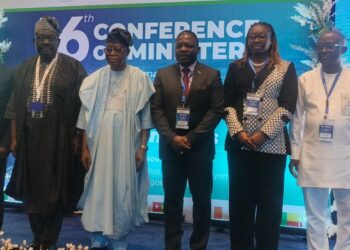By Ameh Ochojila, Abuja
Stakeholders in the maritime industry have drummed up support for the Council for Regulation of Freight Forwarding in Nigeria (CRFFN), and its moves to sanitise the sub-sector.

While they reckoned that the exercise would not be a stroll in the park, they said the reform was worthwhile for the sector and the economy at large.
CRFFN was created by Act No. 16, 2007 with the mandate to regulate and control the practice of Freight Forwarding in Nigeria, and also promote the highest standards of competence, practice and conduct among members of the profession.
However, since the creation of the council, it has been struggling to achieve the mandate and the vision set before it, even though some of its activities were perceived by critics as contributing to the increase in prices of imported goods.
Chris Akanu, a stakeholder, said such criticisms were a natural reaction to change. He said even the individuals, “who are now deliberately miscommunicating the essence of the current efforts of the council would come to hail the results later when the dividends start manifesting.”
Similarly, the Manager of Trista clearing and forwarding agency, Philip Nyakyo, said the challenges of transiting from old practices of the sector to the new would not be an easy one, as those who were hitherto operating in the old fashion would certainly resist it for fear of losing out.
For example, CRFFN’s target of collecting between N5 billion and N10 billion yearly from Practitioners’ Operating Fee (POF) was earlier met with stiff resistance.
The proposed plans were that under the POF regime, importers would pay N3.5 per tonne of cargo imported into the country, N1.5 per kilo for air cargo, N1, 000 on each imported 20-feet container and N2, 000 per 40-feet container.
Unfortunately, despite the Minister of Finance, Budget and National Planning, Zainab Ahmed’s letter dated January 6, 2020, which approved the commencement of the collection of POF at the nation’s seaports by the CRFFN, it was vehemently opposed to by some freight forwarders.
However, following the intervention of the Minister of Transportation, integration with Seaport Terminal Operators of Nigeria (STOAN) has taken off and even the POF collection has commenced nationwide to the tune of 50 per cent and is gaining momentum.
To douse the earlier opposition due to lack of understanding, a nationwide sensitisation workshop on the POF regime was conducted in Lagos, Port Harcourt and Kano state, representing the key operational zones of the Council for a smooth take-off.
At first, when the Council introduced POF, clearing agents across the country vehemently opposed it. As if that was not enough, the port economic regulator, the Nigerian Shippers Council (NSC) was totally against the fee being tied to cargoes leaving Nigerian ports.
According to the former Vice-Chairman of the Council, Chief Henry Njoku, now that the regulatory body of the freight forwarding industry in Nigeria has stabilised, every declaration made by Customs brokers would earn them a commission.
“Now that the Council has been stabilised, the board has ensured that clearing agents get some commission and percentage from all their declarations.
“This is a percentage, which they have not gotten before in their life. This is the first Council that has made it gazetted that when agents pay money, the certain commission should be given back to them,” he said.
Another transport sector analyst, Fanen Elaija noted that the one-year strategic plan developed to give the Council a new direction, and a bi-weekly management meeting institutionalised to strengthen team spirit among management staff was the right way to go.
He said that Nwakohu’s plans and strategies for his first 100 days in office have succeeded in engaging stakeholders and showcasing the unsung achievements of the Council.
The council has also created a website committee to work alongside SW Global with the sole task of updating the website in terms of contents and structure to reflect the status of the Council and the scope of its operations.
An industry watcher, Alex Ogunde, has noted that some of the reforms introduced by the council were actually novel to some sector players and would naturally attract reactions.
Furthermore, he noted that these reactions were reflected in petitions flying around against the new management of the council led by the Registrar. He advised him to be consistent in the reforms as it was natural to resist changes.
Another industry watcher, Jude Okeke, said in time past, there were two freight forwarders’ associations that were most times engaged in a battle of supremacy.
And while appraising the CRFFN, its Registrar; Mr Samuel Nwakohu believes that for the freight forwarding business to contribute its quota to national development as envisaged by the government, it must first be repositioned. Some of the specific measures CRFFN has taken in this direction include setting minimum educational/professional qualifications for freight forwarders, professional training, sensitisation and accreditation; registration of practitioners for ease of supervision, monitoring and discipline; establishment of operational standards and guidelines, the introduction of welfare programmes for freight forwarders and CRFFN, amongst others.
For the first time since its establishment, CRFFN, under Nwakohu’s leadership, has been able to determine the minimum qualification to practice freight forwarding in Nigeria. This is the International Federation of Freight Forwarders Associations (FIATA) Diploma in Freight Forwarding and Supply Chain Management or its equivalent, the Executive Professional Diploma in Freight Forwarding and Supply Chain Management.
Three new institutional accreditations have been finalised for the purpose of increasing freight forwarders’ access to CRFFN’s approved qualifications and are accordingly available on the website of CRFFN, said Nwakolu. These include the University of Lagos, University of Nigeria, Nsukka and Umaru Ali Shinkafi Polytechnic Sokoto.
The council has also concluded integration with the Nigerian Ports Authority and currently integrating with Seaport terminals Operators Association of Nigeria (STOAN) for the purpose of smoothening POF collection and improving operational efficiency.
CRFFN has signed a Memorandum of Understanding (MOU) with World Passport Logistics (WPL) to enable Certified Freight Forwarders to enrol for a loyalty programme that would enable them to benefit by routing their cargoes through participating hub ports around the globe. It is expected to facilitate transit time of their cargoes thereby improving the country’s Logistics Performance Index (LPI).
Read Also: Shipping Position Interaction with Barrister Samuel Nwakohu
The Registrar/CEO disclosed that all is now set for the commencement of nationwide training of freight forwarders towards improving Nigeria’s ranking on the Global Logistics Performance Index.
CRFFN under Nwakohu’s leadership takes staff welfare seriously. This is based on the belief that the council can only discharge its mandate if it stands on a solid footing. As of October 2021, all management staff promotion has been completed. The release of the 2018 promotion results of the staff on CONRAISS 03 – 11 has been affected.
Recommendations on Senior Staff Promotion for 2019 is currently undergoing review.
The Kano Zonal Office construction is over 95% completed while two new zonal offices have been created in Enugu and Sokoto states.
Also, the procurement and allocation of project vehicles have been concluded to facilitate work in all zones and offices.
The council has concluded a series of staff training across the board, including specialised ICT training to provide support for its sustainable operations.
It has also provided additional accommodation for staff to make the environment conducive for its operations.
The council has also purchased staff buses to facilitate staff transportation to and from work for the ease of transportation of workers in line with the policy thrust of the new administration.
According to Nwakohu, the warfare of staff is top on his priorities and would continue to ensure that necessary tools are available for ease of conducting their daily business in line with best global practice.
Kindly like us on Facebook
















Discussion about this post